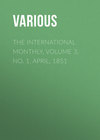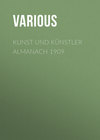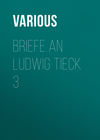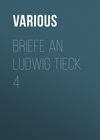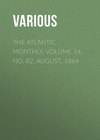Buch lesen: «The International Monthly, Volume 3, No. 1, April, 1851», Seite 8
The same is true of the second work, on the "Serpent Symbol," etc., which, however, is chiefly devoted to inquiries into the philosophy and religion of the aboriginal American nations, and the relations which they sustained to the primitive systems of the other continent. The principal inquiry is, how far the identities which, in these respects, confessedly existed between the early nations of both worlds, may be regarded as derivative, or the result of like conditions and common mental and moral constitutions. These are radical questions, which must be decided before we can, with safety, attempt any generalizations on the subject of the origin of the American race, which has so long occupied speculative minds. Mr. Squier, in this volume, has brought together a vast number of new and interesting facts, demonstrating the existence of some of the most abstract oriental doctrines in America, illustrated by precisely identical or analogous symbols; but he does not admit that they were derivative, without first subjecting them to a rigid analysis, in order to ascertain if they may not have originated on the spot where they were found, by a natural and almost inevitable process. The work, therefore, is essentially critical, and may be regarded as initiatory to the investigation of these subjects, on a new and more philosophical system. It is the first of a series, under the general title of "American Archæological Researches," of which, it is announced in the advertisement, "The Archæology and Ethnology of Central America," and "The Mexican Calendar," will form the second and third volumes.
Besides these works, Mr. Squier has now in press, Nicaragua: Its Condition, Resources, and Prospects; being a Narrative of a Residence in that Country, and containing also chapters illustrative of its Geography, Topography, History, Social and Political Condition, Antiquities, &c., illustrated by Maps and Engravings. This cannot fail of being a book of much interest and value. We are confident that it will be worth more than all the hundred other volumes that have been printed upon the subjects which it will embrace. Mr. Squier, while Chargé d'Affaires to Central America, and Minister to Nicaragua, enjoyed extraordinary opportunities, in his relations with the chief persons of those countries and his frequent tours of observation, for obtaining full and accurate information, and the general justness of his apprehensions respecting affairs may be relied upon.
The Rev. Dr. Schroeder has in press a History of Constantine the Great, in which we shall have his views of the Church in the fourth century.
Mr. Charles Astor Bristed, whose clever sketches of American Society we have copied into the International as they have appeared in the successive numbers of Fraser's Magazine, has addressed the following letter to Mr. Willis, upon an intimation in the Home Journal that under the name of Carl Benson he described himself:
"My Dear Sir:—Several intimations to the above effect have already reached me, but now for the first time from a source deserving notice. Allow me to deny, in toto, any intention of describing myself under the name of Henry Benson. Were I disposed to attempt self-glorification, it would be under a very different sort of character. Here I should, in strictness, stop; but, as you have done me the honor to speak favorably of certain papers in Fraser, perhaps you will permit me to intrude on your time (and your readers', if you think it worth while), so far as to explain what (not whom) Mr. Benson is meant for.
"The said papers (ten in all, of which four still remain in the editor's hands), were originally headed, 'The Upper Ten Thousand,' as representing life and manners in a particular set, which title the editor saw fit to alter into 'Sketches of American Society'—not with my approbation, as it was claiming for them more than they contained, or professed to contain. Harry Benson, the thread employed to hang them together, is a sort of fashionable hero—a quadratus homo, according to the 'Upper Ten' conception of one; a young man who, starting with a handsome person and fair natural abilities, adds to these the advantages of inherited wealth, a liberal education, and foreign travel. He possesses much general information, and practical dexterity in applying it, great world-knowledge and aplomb, financial shrewdness, readiness in composition—speaks half-a-dozen languages, dabbles in literature, in business, in every thing but politics—talks metaphysics one minute, and dances a polka the next—in short, knows a little of every thing, with a knack of reproducing it effectively; moreover, is a man of moral purity, deference to women and hospitality to strangers, which I take to be the three characteristic virtues of a New-York gentleman. On the other hand, he has the faults of his class strongly marked—intense foppery in dress, general Sybaritism of living, a great deal of Jack-Brag-ism and show-off, mythological and indiscreet habits of conversation, a pernicious custom of sneering at every body and every thing, inconsistent blending of early Puritan and acquired Continental habits, occasional fits of recklessness breaking through the routine of a worldly-prudent life. The character is so evidently a type—even if it were not designated as such in so many words, more than once—that it is surprising it should ever have been attributed to an individual—above all, to one who is never at home but in two places—outside of a horse and inside of a library. Most of the other characters are similarly types—that is to say, they represent certain styles and varieties of men. The fast boy of Young America (from whose diary Pensez-y gave you a leaf last summer), whose great idea of life is dancing, eating supper after dancing, and gambling after eating supper; the older exquisite, without fortune enough to hurry brilliantly on, who makes general gallantly his amusement and occupation; the silent man, blazé before thirty, and not to be moved by any thing; (a variety of American much overlooked by strangers, but existing in great perfection, both here and at the south;) the beau of the 'second set,' dressy, vulgar and good natured; these and others I have endeavored to depict. Now, as every class is made up of individuals, every character representing a class must resemble some of the individuals in it, in some particulars; but if you undertook to attach to each single character one and the same living representative, you would soon find each of them, like Mrs. Malaprop's Cerberus, 'three gentlemen at once,' if not many more; and should one of your 'country readers,' anxious to 'put the right names to them,' address—not one, but five or six—of his 'town correspondents,' he would get answers about as harmonious as if he had consulted the same number of German commentators on the meaning of a disputed passage in a Greek tragedian. Some of the personages are purely fanciful—for instance, Mr. Harrison—such a man as never did exist, but I imagine might very well exist, among us. But, as the development of these characters is still in manuscript, it would be premature to say more of them.
"Yet one word. The sketches were written entirely for the English market, so to speak, without any expectation of their being generally read or republished here. This will account for their containing many things which must seem very flat and common-place to an American reader—such as descriptions of sulkies and trotting-wagons, how people dress, and what they eat for dinner, etc.; which are nevertheless not necessarily uninteresting to an Englishman who has not seen this country. Excuse me for trespassing thus far on your patience, and believe me, dear sir, yours very truly
C. A. Bristed."
Benjamin Silliman, LL.D. and his son Benjamin Silliman, junior, of Yale College, sailed a few days ago for Europe, for the purpose chiefly of making a geological exploration of the central and southern portion of that continent. After visiting the volcanic regions of central France, they will make the tour of Italy, visiting Vesuvius and Etna, and will return to England in time to attend the meeting of the British Academy of Sciences, at Ipswich, in July. They will next visit Switzerland and the Alps, and return home in the autumn.
The second volume of The Works of John Adams, we understand, has been very well received by the book-buyers. It is frequently observed of it, that it vindicates the title of its eminent author and subject to a higher distinction than has commonly been awarded to him in our day. It certainly is one of the most interesting biographies of the revolutionary period that we have read. The third and fourth volumes will be published by Little & Brown about the beginning of May.
"The Cæsars," by De Quincy, is the last of the works by that great author issued by Ticknor, Reed, & Fields, who promise us in their beautiful typography all that the "Opium Eater" has written. "The Cæsars" is a very remarkable book.
Of The Edition Of The Writings of Washington by Jared Sparks, we published some years ago in the Philadelphia North American an opinion which was amply vindicated by citations and comparisons, and more recently, in the International for last December, we substantially repeated our judgment in the following words, in reply to some observations on the subject in the Paris Journal des Debats:
"But the omissions by Mr. Sparks—sometimes from carelessness, sometimes from ignorance, and sometimes from an indisposition to revive memories of old feuds, or to cover with disgrace names which should be dishonored, and his occasional verbal alterations of Washington's letters, prevent satisfaction with his edition of Washington."
Since then an able and ingenious writer in the Evening Post has criticised the labors of Mr. Sparks in the same manner, and in a second paper conclusively replied to his defenders. We profess thoroughly to understand this matter; we have carefully compared the original letters of Washington, as they are preserved in the Department of State, in the Charleston Library, the New-York Historical Society's Library, and in numerous other public and private collections, and we have come to the conclusion that instead of having done any service to American History by his editions of Morris, Franklin, and Washington, Mr. Sparks has done positive and scarcely reparable injury; since by his incomplete, inaccurate and injudicious publications, he has prevented the preparation of such as are necessary for the illustration of the characters of these persons and the general history of their times. We shall not at present enter into any particulars for the vindication of our dissent from the very common estimation of the character of Mr. Sparks as a historian; but we may gratify some students in our history by stating that A Complete Collection of the Writings of Washington, chronologically arranged, and amply illustrated with Introductions, Notes, &c., is in hand, and will be published with all convenient expedition. It will embrace about twice as much matter as the edition by Sparks, but will be much more compactly printed. It would have appeared before the present time, but for an absurd misapprehension in regard to certain assumed copyrights, which one of our most eminent justices, and several lawyers of the highest distinction, have declared null and impossible.
Mr. Isaac C. Pray is the author of a beautiful volume on the eve of publication, on the History of the Musical Drama. One hundred and sixty pages are devoted to "Parodi and the Opera." Mr. Pray is a capital critic in this department; he has been many years familiar with the various schools of musical art, and at home behind the scenes in the great opera houses of Europe: so that probably no writer in America has more ample material for such a work as he has undertaken. He proposes a series of some half-dozen volumes on the subject.
Mr. Frederic Saunders, an industrious literary antiquary, is publishing in the Methodist Quarterly Review and the Christian Recorder, a series of pleasant reminiscences of the great lights of the church in England, in the last generation. Among his papers that have appeared are entertaining sketches of Edward Irving and Dr. Chalmers.
"The Duty of A Biographer," is very justly described by a writer on this subject in the last Democratic Review. They certainly managed these things better in the days of king Cheops, but biographies would still be written truthfully and to some purpose if there were more honesty in criticism—if the mob of people who fancy they may themselves sometimes be heroes of such writing, did not for their prospective safety denounce every post-mortem exhibition of infirmities; or if to the creatures most largely endowed with the means of hearing, slavering were not more easy than dissection.
ASTONISHING ADVENTURE OF JAMES BOTELLO
WRITTEN FOR THE INTERNATIONAL MONTHLY MAGAZINE
BY W. S. MAYO, M.D. AUTHOR OF KALOOLAH, ETC
To an author who has been accustomed to deal with the startling and the marvellous in the way of incident and adventure, nothing can be more amusing than the confident opinions of critics and readers as to the improbability, and frequently the impossibility, of particular scenes which often happen to be faithful descriptions of actual occurrences. In this manner several passages from "Kaloolah" and "The Berber" have been indicated by some of my many good natured and liberal critics in this country and in England, as taxing a little too strongly the credulity of readers. Among such passages, the escape, in the first pages of the Berber, of the young Englishman, by jumping overboard in the bay of Cadiz, and hiding himself in the darkness of the night beneath the overhanging stern of his boat, has been particularly pointed out. Now, if this was pure invention, it might be safely left to a jury of yankee boatmen or Spanish barquéros to decide whether the incident was not in the highest degree probable and natural; but being literally founded in fact, it is perhaps unnecessary to make any such appeal. There may be, however, a few unadventurous souls who will still persist in their doubts as to the probability of the incident. For the especial benefit of such I will relate the true story of a boat adventure, which in every way is a thousand times more strange and incredible than any of the wildest inventions of the wildest romance.
The voyage of Vasco di Gama around the Cape of Good Hope into the Indian Ocean, was the beginning of a complete revolution in the trade of Europe and the East. This trade, which, following the expensive route of Egypt and the Red Sea, had been for a long time in the hands of the Venetians and Genoese, suddenly turned itself into the new and cheap channel opened by the enterprise of the Portuguese. The merchants of Genoa and Venice found themselves unexpectedly cut off from their accustomed sources of wealth, while a tide of affluence rolled into the mouth of the Tagus, and Lisbon became the commercial mart of the world.
The success of the Portuguese gave a new impulse to the spirit of enterprise which had already been excited among the maritime nations of Europe by the discoveries of Columbus, and efforts to divert a portion of the golden current soon began to be made. The Spaniards, debarred from following the direct route of the Portuguese, by their own exclusive pretensions in the west, and the consequent decision of the Pope, granting to them the sole right of exploration beyond a certain line of longitude to the west, and confining the Portuguese to the east, had, under the guidance of the adventurous Magellan, found a westerly route to the Indies. The English were busy with several schemes for a short cut to the north-west. The Dutch were beginning to give signs of a determination, despite the Pope's decision, to follow the route by the Cape of Good Hope. As may be imagined, these movements aroused the jealousy of the court and merchants of Lisbon. They trembled lest their commercial monopoly should be encroached upon, and every care was taken to keep the rest of Europe in ignorance of the details of the trade, and of the discoveries and conquests of their agents in the East.
Of course nothing could be more injurious to a Portuguese of the time than to be suspected of a design to aid with advice or information the schemes of foreign rivals. Unluckily for James Botello such a suspicion lighted upon him. It was rumored that he was disposed to sell his services to the French. He was known to be a gentleman of parts, well acquainted with the East—having served with credit under the immediate successors of Vasco de Gama—and as competent as any one to lead the Frenchman into the Indian Ocean, and to initiate him into the mysteries of the trade. The suspicion, however, could not have been very strong, and probably had no real foundation in truth, or else more stringent measures than appear to have been used would have been adopted by an unscrupulous court to prevent his carrying his designs into execution. The rumor, however, had its effect; and Botello soon found that his influence at court was gone, and that he had become an object of jealous observation.
Anxious to give the lie to this calumny, and to regain the favor of his sovereign, John III, Botello embarked as a volunteer in the fleet which was taking out to Calicut the new viceroy, De Cunna. Upon the arrival of this fleet, the operations of the Portuguese, both military and commercial, were carried on with renewed vigor; and in all these Botello bore his part, but without being able wholly to remove the suspicions with which he was sensible his actions were still watched by his superiors. A favorite project of the Portuguese—one that had been pursued with energy and by every means of diplomacy or war—was the establishment of a fort in Diu, a town situated at the mouth of the Gulf of Cambaya. Several times the capture of the place had been attempted by force, but without success. Even the great Albuquerque had been foiled in a furious attack. Failing in this, the Portuguese repeatedly endeavored to get permission to erect a fort for the protection of their trade, by persuasion or artifice. It had become an object of the most ardent desire, as well with the king and court at home, as with the viceroys and their officers in the East.
It happened now in the year 1534, that Badur, king of Cambaya, was sorely pressed by his enemy the Great Mogul—so much so, that he was compelled to call in the assistance of his other enemy, the Portuguese. The price of this assistance was to be permission to erect and garrison a fort at Diu. Badur hesitated; he knew that if the Portuguese were allowed a fort, they would soon be masters of the whole town; but his necessities were urgent, and he finally acceded to the demand. De Cunna rushed to Diu; a treaty was speedily concluded with Badur—the fort was planned, and its erection commenced with vigor.
No one better than Botello knew how pleased King John would be with the news. He resolved to be the bearer of the good tidings, and thus to restore himself to the royal favor. His plan was a bold and daring one; in fact, considering the known dangers of the sea, and the then imperfect state of navigation, it must have seemed almost hopeless; but he suffered no doubts or apprehensions to prevent him from carrying it into immediate effect. In order to conceal his design, he gave out that he was going on a boat excursion up the Gulf of Cambaya, to visit the court of the now friendly Badur. Two young soldiers, of inferior degree, named Juan de Sousa and Alfonzo Belem, readily consented to accompany him. The boat selected for the voyage was a small affair—something like a modern jolly boat, though of rather greater beam in proportion to its other dimensions; its length was sixteen feet, its breadth nine feet. Four Moorish slaves from Melenda, on the coast of Africa, were selected to work the boat, while two native servants, having Portuguese blood in their veins, completed the crew.
Botello's preparations for the voyage were soon made; and waiting only to secure a copy of the treaty with Badur, and plans of the fort which had been commenced, he ordered the short mast, with its tapering lateen yard, to be raised, and the sail trimmed close to the breeze blowing into the roadstead of Diu. But instead of turning up along the northern coast of the Gulf of Cambaya, he directed the bow of his little bark boldly out to sea.
His companions knew but little of navigation; but they knew enough to know that a south-westerly course was hardly the one on which to reach Cambaya. To the remonstrances of Juan and Alfonzo, Botello simply replied that he preferred sailing south with the wind, to rowing north against it; and they would find the course he had chosen the safest and shortest in the end.
In this way they sailed for three days. On the morning of the fourth, Botello found that it would be impossible for him longer to turn a deaf ear to the mutterings of discontent among his crew. It was high time for an explanation of his plans; and trusting to his eloquence and influence, he proceeded to unfold his design.
Imagine the astonishment and dismay depicted in the countenances of the servants and sailors when he told them that he purposed making the long and dangerous voyage to Lisbon in the miserable little boat in which they had embarked. But as he went on commenting upon the feasibility of the project, discussing the real dangers of such voyage, and ridiculing the imaginary, and dilating upon the honors and rewards which they would win by being the first bearers of the tidings they carried, a change from dismay to hope and confidence took place in the minds of all his hearers, excepting the African sailors, who did not much relish the idea of so long a voyage to Christian lands. They, however, were slaves and infidels, and their opposition was not much heeded.
To every objection Botello had a plausible reply. He confidently asserted his knowledge of a safe route, and of his ability to preserve their little craft amid all the dangers of the sea.
"But may we not be forestalled in our news, after all," demanded Alfonzo, "by the vessels from Calicut?"
"No fear of that," replied Botello. "The news from Diu will not reach Calicut for a month, and then it will be too late in the monsoon to dispatch a vessel, even if one were ready. Besides, I have certain information that the viceroy has determined that no dispatches shall be sent home until he can announce the completion of the fort."
"I like not this new route you propose," said Juan. "Why leave the usual course to Melenda?"
"Because we should be in danger of exciting the suspicions of our brethren who now garrison the forts of Melenda, Zanzabar, and Mozambique, and perhaps be detained. No, we will take a more direct course—strike the coast of Africa below Sofalo, and then follow the shore around the Cape of Good Hope."
"And what are we to do for provisions and water, in the mean time?"
"Of provisions we have a store that will last until we reach land, when we can obtain supplies from the natives; as to water, we must go at once upon the shortest possible allowance, and daily pray for rain—St. Francis will aid us. I can show you something that will set your minds easy upon that point."
Botello produced a box from beneath the stern sheets, and opening it, took out with an air of reverence a leaden image of the saint.
"See this," he exclaimed, in a tone of exultation. "It was modelled from the portrait recognized by the aged Moor. Have you not heard of the miracle?—true, you were not at Calicut. Know, then, that a few months since, a native of India was presented to the viceroy, whose reputed age amounted to three hundred years. His story was, that in early youth he encountered an aged man lingering upon the banks of a stream which he was anxious to pass. The youth tendered the support of his strong shoulders, and bore him across the water. As a reward for the service, the old man bade the youth to live until they should meet again. And thus had he lived, until a few months since he was presented to De Cunna, when he at once recognized in a portrait of St. Francis the holy man whom he had carried across the stream. This image was modelled from that portrait; it was blessed by the pious convert in whose person was performed the miracle. Our voyage must be prosperous with this on board."
The sight of an image taken from a portrait acknowledged to be the saint himself, removed all doubt. And what Botello's arguments and persuasions might have failed to accomplish, was easily effected by the little image of lead. A heretic might, perhaps, have questioned the saint's power over the physical phenomena of the sea, but he could not have denied his moral influence over the minds of the adventurous voyageurs who confided in him. No hesitation remained, except in the minds of the four slaves, who, having been forcibly converted from the errors of Mohammed, were yet somewhat weak in the true faith.
It was this want of faith that led to one of the most lamentable events of the voyage. They had been out more than a month without having had sight of land, and not even a distant sail had lighted up the dismal loneliness of the ocean. It must be recollected what a solitude was the vast surface of the Indian and Pacific seas in those days. Beside the Portuguese fleets that followed each other at long and regular intervals, Christian commerce there was none, while Arabian trade was small in amount, and confined to certain narrow channels. The Moorish slaves had never before been so long in the open sea, and their fears increased as day after day the little boat bore them farther to the south. The provisions were also, by this time, nearly exhausted, and the daily allowance of water proved barely sufficient to moisten their parched lips. The slaves, after taking counsel among themselves, demanded that the course of the boat should be arrested.
"And which way would you go?" asked Botello. "Back to Diu? It would take three months to reach the port, and long ere that we should starve."
"Let us steer, then, directly for the African coast. Melenda must be our nearest port."
"Never!" returned the resolute Botello. "I will run no risk of having our voyage frustrated by the jealousy of my old enemy, Alfonzo Peristrello, who has command at that station. Courage for a few days more, and we shall see land. There are isles hereaway that you will deem fit residences for the blessed saints—such fruits! such flowers!"
The promises of Botello had influence with all of his companions excepting the Moors, whose muttered discontent suddenly assumed a fierce and menacing aspect. Luckily, Botello was as wary as he was brave.
It was in the middle of the night that, stretched upon the midship thwart of the boat, he noticed a movement among the Moors, who occupied the bow. One of them moved stealthily towards him, and bending over him, cautiously sought the hilt of his dagger; but before he could draw it, the grasp of Botello was upon his throat, and he was hurled to the bottom of the boat. With a shout, the other Moors seized the boat hooks and stretchers, and rushed upon Botello; but Juan and Alfonzo were upon the alert, and, drawing their long daggers, rushed to his defence. Never was there a more desperate conflict than on that starlit night, in that frail boat, that floated a feeble, solitary speck of humanity on the bosom of the vast Indian sea.
The conflict was desperate, but it was soon over. The Portuguese of those days were other men than their degenerate descendants of the present age; and, besides, the slaves were overmatched both in arms and numbers. Three were slain outright, and the fourth driven overboard. One of the Portuguese servants was killed; thus diminishing the number of the voyageurs more than one-half—a lucky circumstance, without which, most probably, the whole would have perished.
For a week longer the little bark stood on its course, when a violent storm threatened a melancholy termination to the voyage. The wind, however, was accompanied by rain, and Botello kept up the spirits of his friends by attributing the storm to St. Francis, who had sent it expressly to save them from dying by thirst. It would have been perhaps more easy to believe in the saint's agency in the matter had there been less wind; for in addition to the danger of being ingulfed by the heavy sea, their clothing, which they spread to collect the rain, was so deluged with salt spray as to make the water exceedingly brackish. Bad as it was, however, it served to maintain life until they reached a little rocky, uninhabited island in the channel of Mozambique.
It was with some difficulty that a landing place was found. Upon ascending the rocks, a few scattered palms exhibited the only appearance of vegetation. Their chief necessity—freshwater—however, was found in abundance, standing in the hollows of the rocky surface, where it had been deposited by the recent storm. Several kinds of wild fowl showed themselves in abundance, and so tame as to suffer themselves to be caught without any trouble; while crowding the little sandy inlets were thousands of the finest turtle.
At this spot Botello and his companions rested for a week; which was spent in caulking and repairing their boat and sail, drying and salting the flesh of fowl and turtle, and in filling every available vessel with the precious fluid so liberally furnished by their patron St. Francis.
A succession of storms followed their departure, and tossed them about here and there for so many days, that their reckoning became exceedingly confused. Botello, however, was an accomplished navigator, and his sailor instinct stood him in good stead. Upon returning fair weather he conjectured that he was abreast of Cape Corientes, and the bow of the boat was directed, due east, for the African coast.
